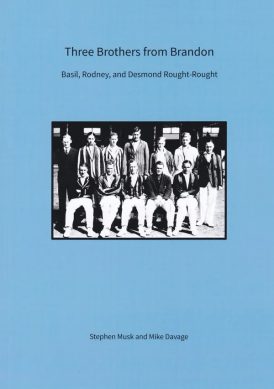Three Brothers From Brandon
Martin Chandler |Published: 2022
Pages: 64
Author: Musk, S and Davage, M
Publisher: Red Rose Books
Rating: 3.5 stars

A question I often ask myself is whether any other field of human endeavour inspires people to write books like this one. The latest publication from Red Rose Books, as this publisher often does, strays a long way from the mainstream of cricketing history, and in doing so proves once again just why some of us find cricket literature so fascinating.
The three brothers referenced in the title are Basil, Rodney and Desmond Rought-Rought. The surname is one that will ring a few bells for some, but probably nothing more. The brevity of the brothers’ First Class careers is the reason for that, and the explanation why they have left no lasting imprint in the game’s record books.
Their story begins with a look back at an interesting family history which culminated in the brothers’ father heading a successful furrier’s business. It is a business which would have been socially unacceptable today, but in any event was brought to its knees in the 1950s when disease decimated the European rabbit population, but by then it had, as far as cricket is concerned, served its purpose.
The brothers’ father was a great cricket enthusiast and whilst not a gifted player himself his success in business enabled him to start a cricket team in Brandon, a small market town in Suffolk close to its border with Norfolk. Having done so he went on to engage the services of former England fast bowler Bill Hitch to coach his three sons. Those seeds sown when all three boys showed an aptitude for the game the business permitted them to play extensively as amateurs through the late 1920s and the 1930s.
Basil, the eldest, was a batsman who very rarely turned his arm over, but Rodney and Desmond were both all-rounders, Rodney primarily a bowler but a useful batsman nonetheless. The two younger brothers went to Cambridge and for that reason each had one season in which they made a number of First Class appearances for the University.
Primarily the brothers played their cricket in the Minor Counties Championship for Norfolk, the three of them often playing together. They also turned out on the First Class field occasionally for representative Minor County sides or for scratch elevens that played occasional First Class fixtures, generally against the Universities.
The question of just how good the brothers were is, given that lack of First Class experience or coverage of their exploits in the national press, a tantalising one. The suspicion must be that all three, particularly Rodney the bowler would, with regular appearances in the First Class game, have established themselves and the press reports the authors have located, and the statistics they have put together, would certainly support that.
There is also plenty of interest in the brothers’ lives outside the game. In time Basil and Rodney were to run the family business. Desmond on the other hand seems to have been a very different character, never playing a major role in the business and, when the Second World War began, persuading a Conscientious Objectors’ Tribunal that he should not have to undertake military service. A contemporary press report of the hearing forms an interesting appendix.
All in all Three Brothers From Brandon is a fascinating glimpse at the lives and times of a brotherhood very much of its time. The only slight frustration is that the book is an extended monograph rather than a full biography. The brothers died in 1995, 1979 and 1970 respectively, but they were not the last of their line. Whilst Basil had no children Rodney had four and Desmond, to add to the intrigue about him, either two, three or four. Given the obvious diligence with which Musk and Davage have carried out their research I can only assume that the descendants either wouldn’t or couldn’t help with any further information, which is a great shame given what we know of the lives their forebears led.






There’s supposed to be a scorecard somewhere that includes the entry Rought-Rought c Rought-Rought b Rought-Rought. Does it exist, though? It didn’t happen in a first-class game.
Comment by Max Bonnell | 10:22am BST 12 April 2022
I remember Basil Rought Rought with great fondness, I was fixture Secretary and Captain of Brandon cricket club from the mid seventies to early eighties. Basil was our president and not only came to watch use play but opened the batting for use on the odd occasion. He took a great interest in the running of the club and help with the maintenance of the wicket . One occasion he got together a Basil Rought Rought eleven to play against a Bill Edrich eleven down at Shotley, I was fortunate enough to be asked to play for the team, there were one or two other members of the Edrich family playing plus a few other ex County players, It was a unforgettable day for a humble club cricketer like myself. Barry Howells
Comment by Barry Howells | 9:50am BST 27 April 2024